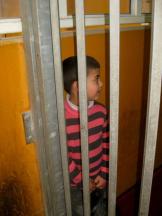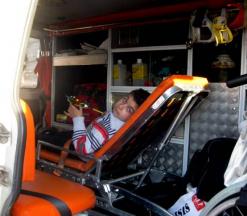Jaba (Lil), Qalandiya
Translator: Charles K.
Hear the fool, hear the man of the spirit
Hosea’s rebuke to Israel is still relevant and right to the point today, twenty-eight hundred years later: “The days of visitation are come, the days of recompense are come, Israel shall know it. The prophet is a fool, the man of the spirit is mad! For the multitude of thine iniquity, the enmity is great.”
“Soldiers, it’s you who are imprisoned – you’re the ones who’ve been occupied!”
That’s what the “crazy” Abu-Nahdi yelled at the soldiers sitting on the other side of the bulletproof window.

People say Abu-Nahdi hadn’t always been crazy. Once he’d been fine, had a lot of money, had lived abroad, and only when they decided to make peace did he return home to the Qalandiya refugee camp. But then his son died. Soldiers shot him in the head, and he died. And the father of the dead child died with his son. Since then Abu-Nahdi has wandered around without purpose, dressed in tattered clothes that had once, long ago, been stylish, always making noise, always muttering, bursting out in hollow laughter.
Listen to Abu-Nahdi. Listen to the madman.
A 13-year-old boy also was at the checkpoint, waiting since morning to receive a crossing permit for his father who was scheduled to be operated on the following day. The boy stood for hours at the metal barrier holding a folder full of medical documents. “If he doesn’t receive the permit today – it’s all over for his father,” said a man who also waited at the entrance to the lane to the offices in order to “refresh” his magnetic card.

And a boy, 5 ½ years old, went through the revolving gate before his parents did, and it locked after him. He’s inside, they’re outside. The boy looked at his parents through the bars separating them, half-smiling in mingled embarrassment and fright, until another “click” was heard and his parents hurried to join him.
There was also a young man facing the soldier at the inner inspection booth who wanted to go to the Shabak offices; he said he had something to take care of, “only a few minutes, that’s all,” he asked. “Bro,” said the soldier, “the mukhabarat (= the Shabak) are on a break; they’re eating,” and sent him back.
And there’s an ambulance at the entrance to the checkpoint that brought a boy from Nablus whose legs are paralyzed. It had been detained for an hour with the excuse that “there’s been no coordination,” and all the while the boy whose legs were strapped to the stretcher lay playing with a colorful plastic pinwheel his father had bought him, and waited. Patiently waited. Because patience is the key to survival for those under occupation. Even a seven-year-old boy already knows that.
And not far away, at the Jaba checkpoint, soldiers from the Oketz dog unit were training another dog: They stopped a passing vehicle, made the driver get out, told him to remove his personal belongings and a Koran.
They viewed that as a humane gesture, a sign of respect.
The driver stood off to the side, watching the dog sent into the car sniff around the front, the rear, in the trunk.
He stood trembling. And despite his fear of the guns, and despite the soldiers’ orders, he couldn’t refrain from moving forward as if to protect the vehicle from the intruder.
“What’s with you?,” asked the soldier. “The dog won’t do anything to the car.”
I intervened, taught them something about Islam. I explained that, to an observant Moslem, a dog is like a pig to a religious Jew; not only its body but also its breath defiles whatever it touches. As I spoke I saw out of the corner of my eye the man nodding.
When the dog had finished its job I took out a package of wipes; he and I cleaned the interior surfaces that the dog had touched and on which it had breathed.
I don’t know whether the soldier thought me a lunatic, nor do I care, but later one of the dog handlers – her name was Roni – approached me wanting to talk, to understand.
